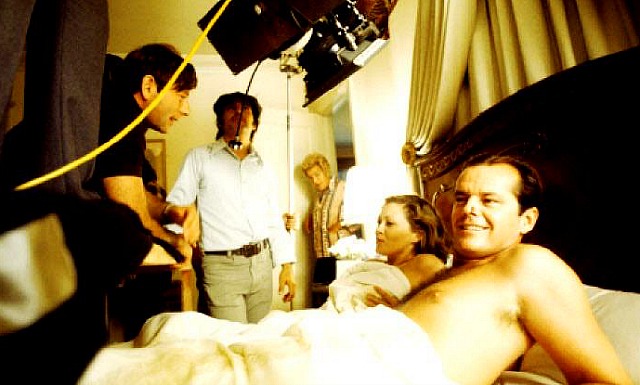I laid down for a short nap around 7:30 pm, and awoke at 1:30 am. I wrote and read for four hours, flopped again and woke around 2:30 pm. A brass band was playing nearby, up the staircase and about a block away, adjacent to rue d’Abbesses. It reminded me of the brass band funeral march at the beginning of The Godfather, Part II. I laid my Olympus on the window sill and hit “record”. A nice mood-setter as I prepared my first cup of coffee. (Note: The band doesn’t kick in until the 30-second mark.)
Daily
Awakenings


Who sticks out in this wall poster? Obviously Brolin. Deadpool himself is presented as a secondary character.

Right outside Hollywood Elsewhere’s 2nd floor pad at 35 rue Andre Antoine.



Worst gelato flavors I’ve ever considered in my life.
Nerdy But Undeniable
If Disney in fact decides to make a Han Solo trilogy, they need to dump Alden Ehrenreich and hire Ansel Elgort. Ehrenreich will simply become the George Lazenby of the Star Wars series — a one-off who was quickly dropped and replaced. No problem, fans are willing to adapt and forgive, but get rid of that beady-eyed, small-shouldered, square-faced short guy and hire a proper Han…Jesus.
Antsy Publicists = Instinct To Avoid Cannes
Variety‘s Ramin Setoodeh and Brent Lang have reported that the people behind Bradley Cooper‘s A Star Is Born, currently regarded as a potential Best Picture contender, said no to an invitation to premiere in Cannes next week. Cooper, Lady Gaga and the film itself, which various actors (Sean Penn, Robert De Niro, Barbra Streisand, Jennifer Lawrence) have said is extraordinary, would’ve gotten a huge promotional bounce out of a Cannes premiere.
So why the ixnay? Probably because A Star Is Born is a little too commercial (i.e., too nakedly emotional, too Access) for this critic-driven festival, and award consultants calculated that a certain percentage of Cannes critics would trash it simply because of the emotional current, and so they figured why risk it?

Variety says Cannes also invited Luca Guadagnino‘s Suspiria to attend, but Amazon said no. My guess is that they were slightly concerned about the fact that Suspiria, however scarily effective, is anything but a typical Guadagnino film and represents, in fact, a sharp departure from the sensual splendors of I Am Love, A Bigger Splash and Call me By Your Name. They knew that a certain portion of Cannes critics might feel distanced by this on some level, and so they got scared and decided to restrict themselves to the fall circuit.
Award-season consultants have been advising their clients to avoid Cannes for years. Add to this the calamitous Netflix withdrawal (no Roma, Norway or The Other Side of the Wind) and a general feeling, reflected by the Variety headline “Will Cannes Remain Influential?”, that the sun may in fact be setting on this much-beloved gathering, and you’re left with guys like me thinking I should probably save my travel dough for Telluride and Toronto, etc. Winds are shifting, wheels are turning.
“The truth is that Cannes’ influence and effervescent mixture of celebrity and cinephilia have been fading for several years,” Setoodeh and Lang write. “It costs tens of millions for studios to fly directors and stars to the Mediterranean town, an expense that shrinking indie players can’t afford.”
I’ve noted before that the only apparent bright lights are Asghar Farhadi‘s Everybody Knows, Pawel Pawlikowski‘s Cold War, David Robert Mitchell‘s Under The Silver Lake (which I’ve heard good but mixed things about), Matteo Garrone‘s Dogman, Jafar Panahi‘s Three Faces, Spike Lee‘s BlacKkKlansman and Lars Von Trier‘s out-of-competition The House That Jack Built.
Grandma’s Ghost?
I’m very sorry I missed Ari Aster‘s Hereditary (A24, 6.8) at last January’s Sundance Film Festival. It seems that I’ve been paying the price ever since. I’m partly blaming the festival programmers as two of Hereditary‘s four public showings were midnighters, and I don’t do those as a rule. My only real shot was catching an 8:30 pm screening at the MARC on Monday, 1.22, but I had a conflict. If Sundance is about one thing, it’s “choose right or lose.” Have A24 publicists since offered one or two screenings to people like me? Of course not. All I know is, I missed a biggie — this year’s Babadook or The Witch. Toni Collette, Alex Wolff, Milly Shapiro, Ann Dowd, Gabriel Byrne, etc.
Unpacked
Roughly an hour ago Hollywood Elsewhere took up residence at 37 rue Andre Antoine in Montmartre. A first-floor apartment (i.e., one floor up from the street) with a decent-sized bedroom, a smallish living room, a first-rate kitchen, a nice bathroom with a washing machine and a toilet closet. Large French windows, plenty of light. Just down the steps from rue d’Abbesses.
There’s a Serge Gainsbourg quote on the white wall in front of the apartment. It’s from a Gainsbourg 70’s hit called “Variations of Marylou”. Pretty cool graffiti. Only in France. A friend offered a translation:
“With her absent look
And her absinthe irises
Marilou has fun making smoke rings
of dry menthol
Between two comic-strip bubbles”
No sleep during last night’s JFK-to-Dublin flight, which left around 5:30 pm and arrived at 4:25 am. The Dublin-to-Paris flight left at 6:40 am, arrived at CDG…I forget but the flight lasted around 100 minutes, maybe a bit longer. Why go through Dublin? It was cheaper, or so it seemed at first.
Samantha Geimer to Academy: “Douchebags!”
Samantha Geimer, the once-young victim in the Roman Polanski rape case of 1977, has a WordPress blog called “The Girl”, which addresses this or that hot-button issue. Earlier today she tore into the Academy of Motion Pictures Arts & Sciences for stripping Polanski of his Academy membership over this 41-year-old matter, calling the decision “ugly and cruel”. She also told Vanity Fair‘s Rebecca Keegan that the Academy elites behind Polanski’s expulsion are “douchebags.”
Meanwhile back at the ranch, Polanski attorney Harland Braun has told VF that the 84-year-old director will appeal the Academy of Motion Picture Arts and Sciences’ decision to give him the heave-ho. “We want due process,” Braun said.

“Yellow” Peril
I’ve trashed Alexander Moors‘ The Yellow Birds two or three times since I caught it at Sundance ’17. It’s a reasonably intelligent PTSD drama (i.e., Iraq), but it’s slow and never lifts off and I wound up kinda hating it for the most part. If you ask me Alden Ehrenreich sinks it singlehandedly with his sullen, all-but-unreadable performance as a veteran with a gnawing secret.
The two best things about it are the performances by Toni Collette and Jennifer Aniston, as distraught mothers of Ehrenreich and costar Tye Sheridan‘s characters.
After months of silence and invisibility, The Yellow Birds has finally delivered a trailer. It’ll be released exclusively on DIRECTV between 5.17 and 6.13; Saban Films will open it theatrically on 6.15.
Based on a 2012 novel by Iraq War veteran Kevin Powers, it’s about the investigation of the death of an Iraq War combatant named “Murph” (Tye Sheridan), but is more precisely about evasions and suppressions on the part of Murph’s PTSD-aflicted comrade, John Bartie (Ehrenreich), when he returns home.
Murph’s mom Maureen (Aniston) naturally wants to know what happened, and Bartie’s mom Amy (Collette) is seriously concerned about her son’s totally withdrawn, zombie-like manner. There’s also a Sergeant Sterling (Jack Huston) with his own buried trauma issues, and a CID investigator (Jason Patric) with a persistent interest in what happened between Murph and John.
I for one sat in my Eccles seat in a state of numb submission, toughing it out and waiting for something (anything!) interesting to happen. Paul Haggis‘ In The Valley Of Elaah (’07), which uses a similar plot and mood, is far more compelling.
Suber’s “High Noon” Commentary on Criterion Channel
UCLA film professor Howard Suber gives great commentary — sage, smooth, learned, insightful. (Here are a few HE posts about the guy.) Roughly 30 years ago I was especially taken with a commentary track he recorded for a Criterion laser disc of High Noon. Suber persuaded me that this 1952 allegorical western, directed by Fred Zinneman and ghost-written by CarlForeman, was more than just a good sit or a striking reflection of Hollywood cowardice in the face of anti-Communist fervor, but one of the all-time greats.
Last night Suber announced that his High Noon commentary is now accessible (along with the film itself) on the Criterion Channel via Filmstruck. Never before offered on Bluray or DVD, and definitely worth it…trust me.
Once again, HE’s 7.27.09 High Noon vs. Rio Bravo comparison piece:
Talk to any impassioned, ahead-of-the-curve film snob about classic westerns, and he/she will probably tell you that Howard Hawks‘ Rio Bravo (1959) is a much better, more substantial film than Fred Zinneman‘s High Noon (1952). More deeply felt, they’ll say. Better shoot-em-up swagger, tastier performances, more likable, more old-west iconic. Many people I know feel this way. And now here‘s director Peter Bogdanovich saying it again in a New York Observer piece — Rio Bravo is even better than you thought, High Noon doesn’t hold up as well, etc.
Something snapped when I read Peter’s article this afternoon. Goddamn it, the Rio Bravo cult has gone on long enough. Bogdanovich calls it “a life-affirming, raucous, profound masterpiece” I’m going to respond politely and call that a reach. I admire Hawks’ movies and the whole Hawks ethos as much as the next guy, but it’s time to end this crap here and now.
High Noon may seem a bit stodgy or conventional to some and perhaps not as excitingly cinematic to the elites, but it’s a far greater film than Rio Bravo.
It’s not about the Old West, obviously — it’s a metaphor about the Hollywood climate of the early ’50s — but it walks and talks like a western, and is angry, blunt, honed and unequivocal to that end. It’s about the very worst in people, and the best in a single, anxious, far-from-perfect man. I’m speaking of screenwriter-producer Carl Foreman, who was being eyeballed by the Hollywood right for alleged Communist ties when he wrote it, and receiving a very tough lesson in human nature in the process. He wound up writing a crap-free movie that talks tough, cuts no slack and speaks with a single voice.
“Beyond Great”
Take this with a grain, but a day or two ago there was a Los Angeles screening of Alfonso Cuaron‘s Roma, and a fellow confides that a person he trusts saw it, and that their reaction was “wow wow wow wow WOW WOW OH MAMA…yesss!!!” Seriously, they said that Cuaron’s black-and-white Mexico City family drama, set in the early 70s, is “beyond great.” And to think, we’d all be seeing it in Cannes next week if not for the Netflix brouhaha. Thanks, guys!
Cosby, Polanski Ejection
Actions have consequences but…
“The Academy of Motion Picture Arts and Sciences’ Board of Governors met on Tuesday night (May 1) and has voted to expel actor Bill Cosby and director Roman Polanski from its membership in accordance with the organization’s Standards of Conduct. The Board continues to encourage ethical standards that require members to uphold the Academy’s values of respect for human dignity.”
My only comment, which I shared with a friend, was “did they really have to couple Polanski with Cosby?”
To which she replied, “Rapist, rapist. It’s how the Academy sees it and all of the shrieking mob chasing after them.”
And I said, “Okay, but Cosby’s criminality was far more odious. Decades of persistent, diabolical and premeditated rape with the use of sedatives and Mickey Finns. Polanski wasn’t on that level. Not even close.”





